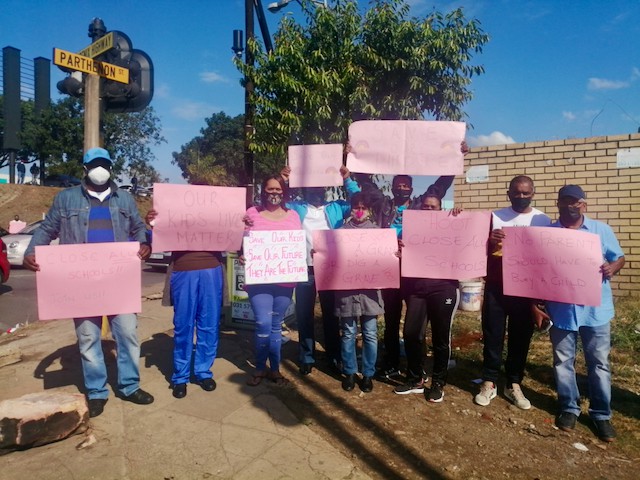
17 August 2021
Parents held a placard demonstration at the Phoenix Plaza on Sunday and at Wembley Primary School, where a Grade 7 learner, Kaitlyn Pillay, succumbed to the virus. Photo: Nokulunga Majola
On Sunday and on Monday morning parents held placard demonstrations at the Phoenix Plaza and at Wembley Primary School in Phoenix, north of Durban. The group, Save Our Kids, want the Department of Basic Education to close all schools because of Covid-19.
This comes after Kaitlyn Pillay, a 12-year-old, grade 7 learner at Wembley Primary, tested positive for Covid-19 last week and died on Saturday. She was laid to rest on Sunday.
Her devastated mother, Karishma Pillay, said Kaitlyn tested positive for Covid on Thursday last week. “She was so scared to go out and she wanted to be a paramedic when she was older, but that will never happen now. She always wanted to do something for herself and she used to tell me that she will take me along when she travels the world. She was looking forward to starting high school next year. This is the hardest thing for us. We were very close,” said Pillay.
Spokesperson for the group, which calls itself Save Our Kids, Rafi Bux, said, “The Department of Education has failed to take into consideration the impact of the new Covid Delta variant and the infection rate it has among learners in their impact assessment.
“It has also failed to positively identify infected students and keep them out of the premises to prevent the spread of the virus.
“The Department of Basic Education has also failed to give positive assurance to the parents regarding the safety of the children or to offer a tentative contingency plan to continue the school year without any danger.”
He said schools must close until the department can present a proper plan to safeguard children.
A memorandum of concerns was sent to the department on Monday.
KwaZulu-Natal Parent Association chairperson Vee Gani said he has been inundated with calls from concerned parents, teachers and school governing bodies. “Parents are acting on their rights to protect their children and it is understandable. Even teachers are concerned and worried about their safety as well. The Department of Education needs to have an intervention plan on how to prevent the spread of the virus in schools,” he said.
“It is a good idea to have all the kids vaccinated so that at least they have some sort of protection against the virus but that is up to the parents,” said Gani.
(Actually Covid vaccination is not approved for children, though this may change in due course. And there is no way for parents to currently get their children vaccinated.)
Nic Spaull, an education expert at Stellenbosh University, warned against closing schools.
He told GroundUp: “It is a tragedy when anyone dies of Covid-19, especially a child. Parents are also understandably worried about their children given that we are in a pandemic. Although it is extremely extremely rare that children die of COVID-19, it is not impossible. For example, there are 21,825,534 children aged 19 or younger. Since the beginning of the pandemic last year 380 children died of COVID-19. That is to say 0,0017% of children. Children are far more likely to die of many other things than COVID-19. Including diarrhea, pneumonia, TB etc.”
“The costs to children of not attending school are dire. Research is now showing that children have lost an entire year of schooling. The average ten-year-old today knows what the average nine-year-old knew in 2019. That is very very worrying. It will take more than a decade to make up for that”
“We must remember that there are 13-million children who go to school when schools are fully open. To close schools for such a large number of children because of a very very small number of deaths is unwise and doesn’t take into account the extremely large costs to millions of children by schools being closed.”
On Sunday, KwaZulu-Natal Premier Sihle Zikalala said, “We have also noticed an increase in cluster cases with schools being the biggest contributor in this regard. In fact, more than 120 schools have reported clusters in their school settings and more than 800 learners and teachers have been affected.”
KwaZulu-Natal MEC for Education Kwazi Mshengu said his department has observed an upsurge of Covid-19 cases in schools affecting both pupils and teachers.
Mshengu said a number of factors contributed to the rise, including the non-compliance with Covid-19 protocols at schools but also at home.
“As we continue to follow the rotational time tabling it does appear that when learners are not in schools they are found mostly on the streets without proper compliance with Covid-19 regulations.
“We also worry that some parents send learners to school in spite of the fact that they either know that they have tested positive or they exhibit some signs of sickness.”
“As the department we continue to make sure that all out schools are compliant, but that can only be effective if everyone within the schooling environment is able to follow the prescribed protocols but also outside,” Mshengu said.
Kaitlyn Pillay, aged 12, died on Saturday. She was laid to rest on Sunday. Photo supplied.